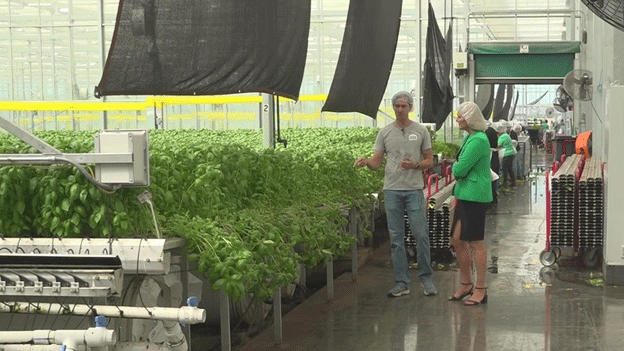Hydroponics, the method of growing plants without soil, has become more than just a niche agricultural practice—it’s a key player in the future of sustainable food production. While hydroponics has been around for decades, it has surged in popularity in recent years, particularly with the legalization of marijuana. However, beyond this market, hydroponics is proving essential for growing food as well. Rising food costs, the strain on natural resources, and the need for year-round production have made this method indispensable for farmers in areas like California’s Solano County.
In Dixon, Solano County, Gotham Greens operates one of its 13 state-of-the-art greenhouses, showcasing just how advanced hydroponic farming has become. According to Nick Bellizzi, who oversees operations at the facility, the greenhouse is equipped with sensors that monitor crucial environmental factors such as temperature, humidity, CO2 levels, and light intensity. This technological sophistication allows farmers to adjust conditions in real time, optimizing plant growth throughout the year.
“The ability to control the environment means we can grow 365 days a year,” Bellizzi explained during a tour of the facility. This year-round capability is one of the most significant advantages of hydroponics, especially as traditional outdoor farming becomes more unpredictable due to climate change. By eliminating dependence on seasonal cycles, hydroponic operations like Gotham Greens can produce multiple crop yields annually, ensuring a steady supply of fresh produce.
While some soil is used initially to establish seedling root systems, the plants are quickly moved into a soilless system. Nutrient-rich water flows through gutters, providing all the essential minerals plants need to thrive. This recirculation system conserves water, a critical factor in California, where water scarcity is an ongoing concern. “We use up to 90% less water than a conventional farm by capturing and recirculating all the water used in our system,” Bellizzi noted.
Solano County’s Agriculture Commissioner, Ed King, echoed this sentiment, pointing out that indoor hydroponic operations are not just an environmental solution—they are also a practical one. “The benefit of growing indoors is that farmers can produce crops year-round,” King said. In regions like Solano County, where agricultural productivity is vital, being able to grow food throughout the year increases both the economic viability of farms and the local food supply.
Despite the higher upfront costs associated with building and maintaining hydroponic facilities, the long-term benefits are increasingly appealing to farmers and consumers alike. Sustainability is a major factor driving this shift. According to King, consumer demand for locally sourced, sustainable food is on the rise, and hydroponic farms are in a unique position to meet this need. “Studies show that the vitamin C levels in produce can decrease every day after harvest, so getting food that is grown locally and sustainably is better for the customer,” he added. Hydroponic systems, which reduce the time between harvest and consumption, ensure fresher, more nutritious produce.
The economic and environmental efficiencies of hydroponic farming are reshaping agriculture in Solano County and beyond. Companies like Gotham Greens are at the forefront of this movement, blending technology with sustainability to create a model that can thrive even in resource-challenged environments. As indoor farming continues to gain traction, more companies are investing in hydroponic infrastructure, recognizing it as a viable path forward for large-scale, sustainable food production.
Looking at the broader context, hydroponic farming is projected to grow rapidly in the coming years. According to market reports, the global hydroponics market is expected to reach USD 17.9 billion by 2026, driven by increasing food demand, resource scarcity, and the need for efficient farming techniques that reduce environmental impact.
Hydroponics is no longer just an alternative farming method; it is becoming a staple in food production, particularly in regions like Solano County. With its ability to conserve water, produce year-round, and meet the growing demand for local, sustainable food, hydroponics represents the future of farming. As more farmers and companies invest in this technology, it will continue to play a crucial role in creating a more resilient, efficient, and sustainable food supply chain.











